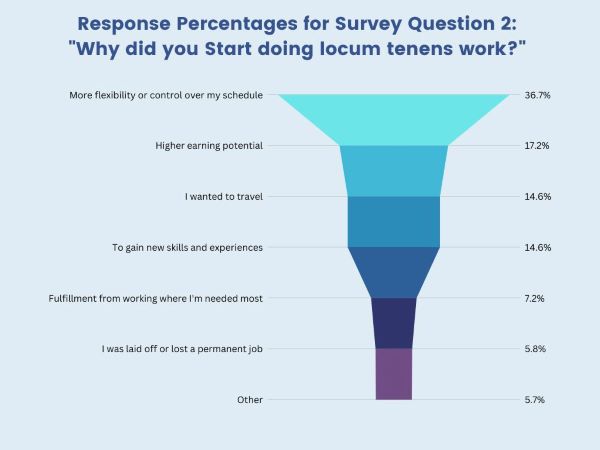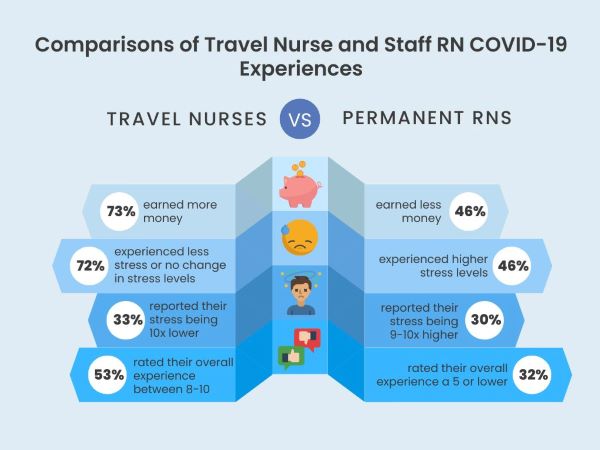INTRODUCTION
Effects of Covid-19 on the Healthcare Industry
When the Covid-19 pandemic swept the nation in 2020, there was not a single US industry left unaffected by the economic ramifications of such a mass crisis. With millions infected, the healthcare sector was put under an especially severe strain as facilities raced against the clock to muster the appropriate resources and medical providers to respond.
The sheer patient overflow experienced by medical facilities during the height of the Covid-19 pandemic necessitated a careful and strategic allocation of the right medical providers to the right places. As institutions acclimated to the new state of healthcare, and Covid response efforts became more structured, the urgent and critical need for high volumes of registered nurses in particular became evident.
The Call for Registered Nurses
While healthcare organizations and Covid relief centers scrambled to fill all of their open RN positions, with many turning to travel nurse staffing agencies, needs for locum nurse practitioners were set aside, and the temporary nurse job market became an RN’s world.
As the call for RNs increased, and earning potential for locum NPs decreased, many Locum NPs faced financial challenges. The overwhelming national outcry for the support of RNs also left many locum nurse practitioners with a moral dilemma regarding how they would do their part in Covid relief efforts.
The Changing Landscape of Locum Tenens
In light of the changing landscape of locum tenens for nurse practitioners, many locum NPs made the career decision to return to their previous practice as registered nurses, either through permanent employment or by way of travel nursing, while others continued their locum NP work as the circumstances of the time stood.
Influenced by individual principles and logic, the varied career choices made by locum NPs during the pandemic resulted in a broad spectrum of different Covid-19 experiences. These varied encounters provide valuable insights surrounding not only the direct impacts of the pandemic on locum nurse practitioners, but also about the benefits and drawbacks of different nursing employment options from the perspective of a locum.
METHODS
Barton Associates’ 2022 NP Covid-19 Experience Survey collected locum NP responses from 287 participants regarding the different ways they chose to navigate the pandemic by sharing a survey which was split off into a tree of various “experience pathways”.
This was done by creating a responsive questionnaire which prompted different follow up questions based on a respondent’s answer to the previous question. For example, if a respondent said that they did not work during the Covid-19 pandemic, they were prompted with a question asking why they did not work, whereas a respondent who answered that they did work during the pandemic was prompted with a question asking what type of work they did.
For multiple choice questions, respondents were able to not only choose multiple answers, but if they did not see an appropriate answer that reflected their experience accurately, they also had an open response option to write in their own answer to the question.
This survey was sent to our contact list of locum tenens nurse practitioners. When the survey officially closed, we then used respondent data to explore which key factors contributed most to nurse practitioners’ varied experiences of Covid-19.
RATIONALE
Like any person considering a career change, locum nurse practitioners have certain needs and desires which a prospective job opportunity or career path must fulfill in order to gain their consideration. Our survey searched for insights into the top motivating factors that influence locum tenens NPs to make changes to their employment.
We then hypothesized that by following the respondents’ journeys into their chosen Covid career paths, we could unravel whether or not each groups’ experiences realistically paralleled the original motivations behind their employment decisions.
FINDINGS
NP Motivators Prior to Covid-19
As the survey encompasses NP experiences both preceding the initial Covid-19 outbreak, and subsequent to its decline in severity, our first finding reveals nurse practitioners’ reasoning behind their decision to start locum work before the pandemic occurred.
Of the 287 locum tenens NPs surveyed, the majority of respondents, close to 37%, reported that they were motivated to do locum NP work because it offered them more flexibility and control over their schedules, while the second-most reported motivation indicated was higher earning potential, at 17.2% of respondents (Figure 1).

*Figure 1
Altogether, well over half of respondents were incentivized to begin doing locum work because they believed locum employment to offer higher levels of flexibility and financial reward. These incentives were locum NPs’ original motivators to break into locum work, as the locum tenens NP profession was yet to be impacted by the pandemic.
Preceding the pandemic, locum tenens employment likely did, in actuality, match up with NP’s motivations and expectations of higher flexibility and income. This assumption is based on the fact that a majority of almost 40% of surveyed locum NPs learned about the benefits of the career path from recommendations which came directly from another locum provider, or from a friend or co-worker who had done locums, and had thus, had experienced the benefits themselves.
Overall Pandemic Effects on Locum NPs
Of the respondents who continued their usual work as locum tenens nurse practitioners during the height of the Covid-19 pandemic, almost half (46.4%) were tempted to return to their practice as registered nurses. An astounding 71.4% of this group was incentivized to switch back to their RN practice due to higher earning potential, providing further evidence that the largest career motivator for locum NPs is increased financial gain.
Surprisingly, in spite of this striking near-half response from those tempted to return to RN practice, when the same group of respondents was asked how the pandemic affected their work as a locum NP, the majority (47.5%) indicated that their employment wasn’t affected at all.
This disconnect may be attributed to the fact that locum nurse practitioners are generally accustomed to earning more than registered nurses, and while most locum NPs felt their work was not affected by Covid-19, they saw that RNs were earning more in the pandemic, and were naturally enticed by the potential to earn more.
Moreover, despite the presence of temptation to switch to RN practice, the finding that a majority of locum NPs felt unaffected by the pandemic disproved our hypothesis that the impacts of Covid-19 were predominantly negative for most locum nurse practitioners, uncovering that, even during a national crisis such as Covid-19, locum tenens work can still be a reliable form of employment for many nurse practitioners.
It is pertinent to note, however, that Barton Associates’ 2022 NP Covid-19 Survey did not factor in location as a contributing factor to changes in job availability, flexibility, or rates. Thus, those NPs who reported no negative impacts to their work due to Covid may well have simply been located, or working in areas that experienced the effects of the pandemic to a lesser degree.
Negative Pandemic Impacts on Locum NPs
Though most locum NPs who continued work as usual through the pandemic indicated that they experienced little to no change to their work as a result, the second largest group of question respondents, 32%, said that their work as a locum NP was, in fact, negatively affected by the pandemic.
Of the locum nurse practitioners who experienced direct negative impacts on their work due to Covid-19, 38%, the majority of respondents, reported that the factor that made their Covid-19 work experience more negative was higher levels of work related stress.
There are many possible factors that could have contributed to these high stress levels, such as the apparent dangerous working conditions and increased patient volumes. While this finding is not surprising, it does reveal stress as another major factor that influences locum NPs’ experiences and perceptions of their work.
Nevertheless, the next largest respondent groups indicated that the biggest negative effects of the pandemic on their work as a locum NP were less job availability (20.8%), and lower earning potential (19%). We suggest that the reported decrease in job availability is inherently connected to not only diminished earning potential, but also to lessened flexibility, as limited job options, in turn, limit a locum’s control over their own work schedule.
In view of this implication, we infer that these findings illustrate how, even through the added stressors created by the Covid-19 pandemic, the two common factors painting locum NPs’ work experiences are earning potential and flexibility.
Some Locum NPs Sought Benefits of RN Pandemic Practice
Whilst the majority of locum nurse practitioners carried on their regular work throughout the pandemic, for 25.4% of respondents who switched back to their practice as RNs during this time, losing their favorite benefits of doing locum work to Covid-19 was much too costly; leading them to make a huge change in their career.
What largely led many locum NP-turned RNs to make this switch, as predominantly reported by 32.6% of respondents, was less job availability as a locum NP, which, as discussed above, is a factor which we propose is directly related to job flexibility and income. In addition to locum NP income loss due to lower job availability, 16% of respondents also indicated that they made the switch due to a decrease in their overall locum NP salaries.
Adding up to a total of 48.6% of respondents who made large shifts in their careers because of monetary and/or flexibility reasons, we suggest that these locum NPs switched their status back to RN in order to obtain the same incentives which locum NP work previously offered, but were lost due to the impacts of the pandemic.
Though the appearance of flexibility and earning potential in respondents’ answers to questions surrounding their career change motivations remain a consistent pattern, the second largest majority response indicated that 23.6% of locum NPs transitioned back into practice as registered nurses because they sought fulfillment from contributing to Covid-19 relief efforts, demonstrating survey respondents’ desires to participate in work with a purpose during times of crisis/increased need.
The Benefits of Travel Nursing Over Permanent Employment
Of the locum nurse practitioners who switched back to working as a registered nurse, 60% chose to work as a travel nurse over permanent employment as a staff nurse. As discussed above, aside from feeling called to aid in Covid-19 relief efforts, a majority of nurses chose to make the switch because they sought higher income and flexibility than that which their work as a locum NP was able to offer at the time.
As opposed to the 40% of locum NPs who found permanent RN employment, almost 50% of which who said that they earned less as a permanently employed RN than they did as a locum NP during the height of Covid-19, 72.7% of the travel nurse group indicated that they earned more as a travel nurse.
Furthermore, 72% of the travel nurse group also said that they experienced less stress or no changes to their stress levels as a travel nurse, while nearly 50% of the permanently employed RNs indicated that they experienced higher levels of stress (Figure 2).

*Figure 2
There are many possible factors that may contribute to registered nurse stress levels, especially during a pandemic, and these factors may also differ based on the type of employment, between travel nursing and permanent employment, that a respondent chose. For permanently employed nurses, stress levels may have been higher due to higher involvement in facility politics, or perhaps because of higher levels of burnout without any changes to their routines, whereas for travel nurses, stress levels may have been reduced due to higher job availability and flexibility, and stable income.
Career Choices Subsequent to Decline in Pandemic Severity
Following Covid-19’s diminished intensity, most surveyed respondents, 57.3% indicated that they returned to their regular work as a locum NP. Of those who switched back to work as usual, the majority of respondents (26.7%) was motivated to do so in order to earn a higher salary, and the second-most reported motivation to switch back was more freedom as a locum NP with 23.3% of respondents.
This finding supports our hypothesis that, under regular conditions, the two main incentives which motivate locum NPs to make major career decisions or changes in their employment are higher earning potential and more flexibility.
CONCLUSIONS
Locum NPs Seek Higher Earning Potential and Flexibility
Our findings indicate a pattern amongst locum NP’s motivations to switch careers prior to the pandemic, during the pandemic, and following Covid-19’s decline in intensity. Though the Covid-19 pandemic naturally brought out other factors which affect locum NPs’ work experiences, including higher levels of stress, and a desire to aid in crisis relief efforts, the incentives of higher earning potential and flexibility were consistently indicated by respondents as prominent motivators behind their career choices.
Travel Work Fulfills Top Sought After Incentives
While there were some discrepancies amongst respondents regarding whether or not their work as a locum NP was impacted by Covid-19, and their coinciding decisions on how they would navigate the pandemic in terms of their career choices, our findings show that overall, between locum tenens and travel nursing employment, travel work as a whole generally fulfilled respondents’ desires for higher earning potential and flexibility.
Locum Tenens is a Stable Career through Crisis Situations
In spite of the fact that many locum NPs felt that their work was negatively impacted by the pandemic, and switched to RN practice, our findings indicate that a majority of locum NP respondents said that their work was left unaffected by Covid-19. Thus, we conclude that locum tenens employment can be considered a viable and rather stable employment option for nurse practitioners, even in light of an international healthcare crisis.
Travel Nursing is Beneficial to RNs
Our findings indicate that, of those locum NPs who returned back to practice as RNs, the majority chose to do travel nursing because they sought fulfillment, higher job availability, and a higher salary. Because most of those who chose travel nurse work had overall better experiences than those who chose permanent RN employment, and travel nursing respondents reported higher earnings and less stress, we conclude that travel nursing can fulfill the same incentives which previously practicing locum NPs seek from their employment. This makes travel nursing a viable option for those who choose to work as an RN, or otherwise do so out of necessity.
Ready to get started on your locum nurse practitioner journey? Fill out our contact form to get in touch with an experience representative and get started!

